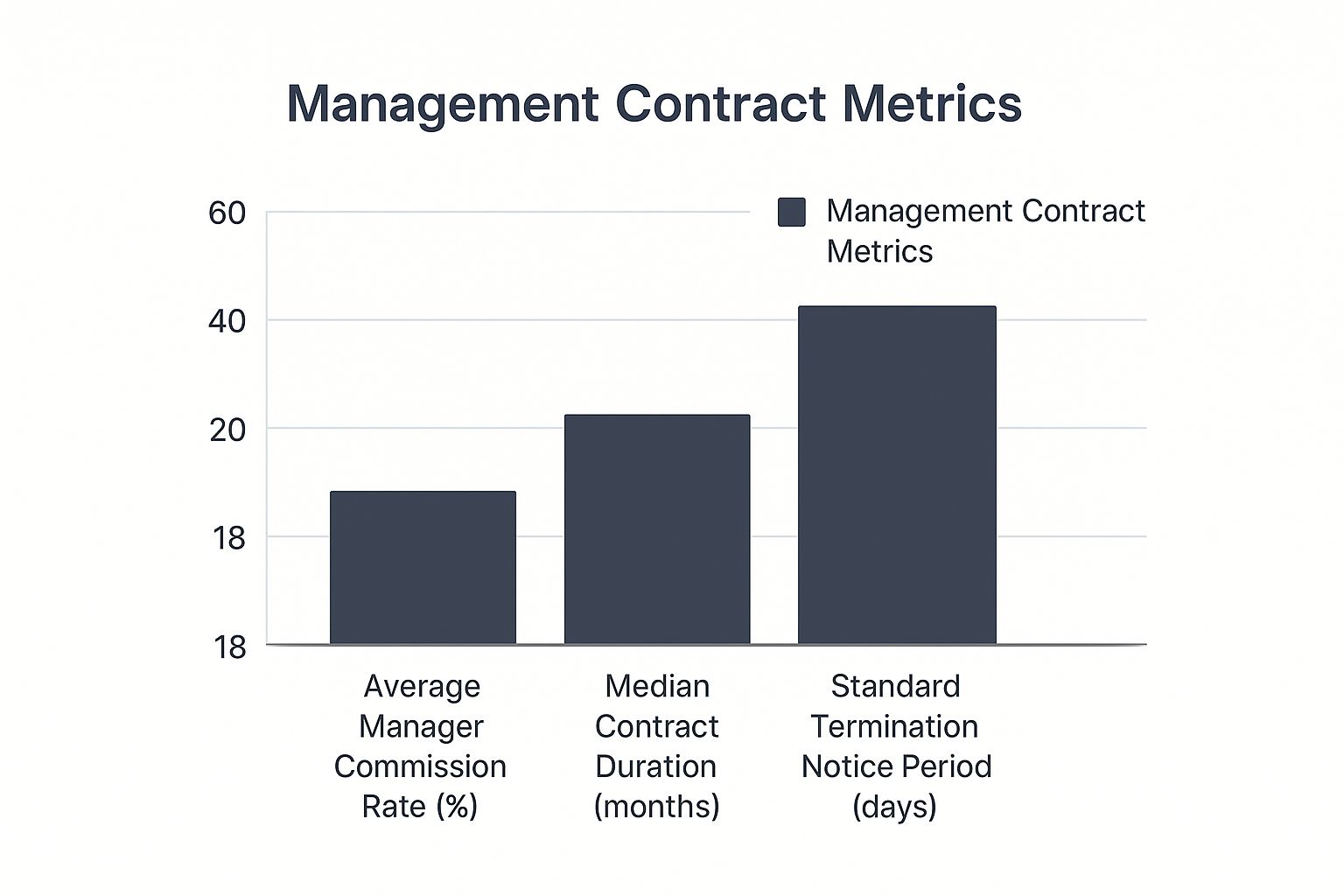Why Band Manager Contracts Actually Make or Break Careers

This screenshot from Wikipedia's talent manager page really highlights how much a manager does. From contracts to career development, it's a lot! This really emphasizes why clear contracts are so important. A manager isn't just booking your gigs; they're shaping your entire career. That's why these contracts are absolutely crucial.
It's easy to get caught up in the excitement of finding someone who believes in your music. Someone who gets your vision. But that informal "honeymoon phase" needs to evolve into a professional, documented agreement. It's like moving in together: you wouldn't do it without talking expectations and boundaries, right? A management relationship is similar. It’s not about distrust; it's about clarity.
For example, let's talk commission. Industry standard is usually 15-25% of gross income. But what exactly is "gross income"? Does merch count? Endorsements? Songwriting royalties? A good contract spells it out, preventing headaches when the money (hopefully!) starts flowing. And don't forget contract length! Shorter terms offer flexibility, longer ones offer stability. Think about what your band needs right now.
Power Dynamics and Protecting Your Future
Who calls the shots? That's another key question your contract needs to answer. Who has the final say on creative decisions versus business ones? Your manager needs enough power to be effective, but you need to retain artistic control. It's a balancing act. A solid contract ensures everyone's on the same page, reducing potential conflicts later.
This leads us to the sunset clause. What happens after the contract ends? Let's say your manager lands a sweet endorsement deal right before your contract expires. Without a sunset clause, you might lose commissions from that deal, even though it was your manager's work. Ouch.
Exclusivity is another biggie. Is your manager handling everything (full exclusivity)? Or just certain things like touring or recordings (partial exclusivity)? Being clear on this prevents confusion and conflicts with other representatives.
These details might seem small, but they can have huge consequences. A solid band manager contract isn't just a legal necessity—it's a strategic move. Protecting yourself legally isn't about expecting the worst; it's about setting your band up for long-term success, whatever comes your way.
Decoding the Legal Jargon That Actually Matters
Most band manager contracts look like they were written by lawyers, for lawyers. The musicians who actually have to live with the terms? Totally forgotten. Let's fix that. We'll break down the essential parts of a solid contract, from commission structures that won't bankrupt you to termination clauses that protect your future. We'll decipher what “gross versus net” actually means for your earnings, why territory restrictions can be huge for touring, and how to spot red flags that signal trouble ahead.

The infographic above gives you some industry averages for key contract elements: manager commission rate, contract duration, and termination notice period. Notice the average commission is around 18%, contracts typically last 24 months, and the standard notice for termination is about 60 days. These are just averages, of course. Your specific contract will have its own unique details, but this gives you a good starting point.
Contract Length and the Sunset Clause
Now, let's talk contract length. Contracts typically run two to five years, with three years being pretty standard. This timeframe gives the manager a decent chance to build your career and see a return on their investment. Learn more about how management works at Soundcharts.
Many contracts also include a "sunset clause.” This lets the manager get a percentage of your earnings for a period after the contract ends – often 18 to 24 months. It’s usually tiered, like full commission for the first six months post-contract, then dropping to 50%, then 25% for the remaining time. This compensates the manager for their past efforts even after they're no longer actively managing you.
Before we dive deeper, let’s look at a breakdown of some crucial contract terms:
Here’s a table summarizing key contract elements, typical industry standards, and some tips for negotiation:
Essential Band Manager Contract Terms Breakdown
Key contract elements with industry standards and negotiation strategies
| Contract Element | Industry Standard | Negotiation Range | Key Considerations |
|---|---|---|---|
| Manager Commission | 15-20% of gross income | 10-25% | Is it gross or net income? Are there different percentages for different income streams (e.g., touring vs. merch)? |
| Contract Duration | 2-3 years | 1-5 years | How long are you comfortable committing? What are the renewal terms? |
| Termination Clause | Mutual agreement or breach of contract | Negotiate specific grounds for termination | What happens if things go south? Who owns what after termination? |
| Sunset Clause | 12-24 months, tiered commission | Negotiable duration and percentages | How long will the manager receive commission after the contract ends? |
| Territory Restrictions | Often global | Can be limited to specific regions | Does the manager have experience in your target markets? |
| Key Man Clause | Common, allows band to terminate if the named manager leaves the agency | Essential to include | Protects you if your primary contact leaves. |
| Expenses | Manager recoups approved expenses from band income | Clearly define what constitutes an “approved” expense | Establish clear guidelines and spending limits upfront. |
This table provides a general overview. Each element deserves careful consideration and discussion with your lawyer.
Understanding the Details
Through real-world examples and straightforward explanations, we’ll cut through the legal mumbo-jumbo and make sure you understand what each clause means for your day-to-day and long-term career. Knowing these seemingly small details in your manager contract can be the difference between a successful partnership and a legal nightmare. So, let’s get you equipped to handle these negotiations like a pro.
Negotiating Smart Without Burning Professional Bridges

This is where I've seen so many bands trip up. They either cave on everything or go into attack mode. Neither approach works. A good band manager relationship starts with a contract that makes everyone feel good and protected. I've seen bands handle this brilliantly, and I’ve also seen promising partnerships crash and burn because the negotiation went sideways.
Preparing for the Conversation
Before you even sit down to talk, know your worth. But just as importantly, know the market. What are other bands at your level paying their managers? What are your must-haves? Maybe you absolutely have to maintain creative control. Or maybe a manager with proven experience in your genre is non-negotiable. Knowing your priorities keeps you focused. A little research goes a long way. Check out this helpful resource on Contract Negotiation Strategies.
It also helps to think about how your current income projections relate to what you expect from your manager. Having concrete figures at the ready will lend weight to your proposal.
Navigating the Negotiation
Timing is key. Don't ambush your potential manager with contract talk right before a gig. Schedule dedicated time to go over the band manager contract. This shows respect and lets everyone focus. When you're discussing the details, frame your requests as a collaboration, not a list of demands. Instead of saying, "We need 20% commission, end of story," try something like, "We're aiming for a 20% commission structure. Is that workable based on our current income projections?" This invites discussion and keeps things positive.
Knowing When to Push and When to Yield
Not every point in the contract is worth fighting over. Focus your energy on the big stuff: commission structure, contract length, how the contract can be ended, and creative control. These are the things that will really shape your career. Other things, like specific expense reimbursements, might be more flexible. Being willing to give a little on smaller items builds goodwill and lays the groundwork for a solid partnership.
Handling Pushback
Expect some pushback; it’s part of the process. Don't take it personally. Instead, really listen to their perspective and try to understand where they’re coming from. If they balk at your proposed commission rate, maybe they have legitimate concerns about your projected income. This is your chance to explain your plans for growth and show them your potential. The goal is a win-win. Everyone should walk away feeling satisfied with the agreement.
Remember, contracts, especially in music, are living documents. Artist management contracts, like recording contracts, change. A 2023 report showed how much artist and label relationships shift. By year seven, 69% of artists signed in 2015 had moved on from their original label. You can discover more insights into contract flexibility in the music industry. This highlights the importance of building a good relationship and approaching negotiations with a collaborative mindset. Effective negotiation isn't just about getting the best possible terms; it's about building a strong partnership that sets everyone up for success in the long run.
The Non-Negotiable Clauses That Protect Your Future
Negotiating a band manager contract? It's like building a house for your music career. Some clauses are like fancy light fixtures – nice, but not essential. Others are the concrete foundation – absolutely crucial. These non-negotiable clauses are your safety net, protecting your creativity and your wallet.
Performance Benchmarks and Accountability
Imagine signing with a manager expecting the world, only to find they're coasting. A performance benchmark clause sets measurable goals – album releases, festival slots, social media growth. This keeps everyone accountable and makes sure your manager is actively working towards your shared vision. For example, a band might include a benchmark of landing a record deal within 18 months or hitting a specific streaming target on Spotify. This makes sure the manager is truly engaged, not just passively collecting commission.
Expense Policies: Preventing Financial Surprises
Ever heard horror stories of bands getting slammed with unexpected management fees? A clear expense policy clause prevents this. It details which expenses the manager can deduct from your earnings and which ones they cover. This isn’t about being stingy; it's about transparency. Specify spending limits for things like promo or travel and require receipts for anything over a certain amount. Think of it as a shared budget – everyone’s on the same page financially.
Conflict Resolution: Saving Relationships
Even the best partnerships have bumps. A conflict resolution clause outlines how to address disagreements. Maybe it's mediation or arbitration – a neutral third party helping find solutions. This prevents conflicts from becoming legal battles, preserving your working relationship and preventing costly disputes. This is especially crucial for sensitive issues like creative direction or financial disagreements.
Key Person, Territory, and Exclusivity: Controlling Your Career
You chose a specific manager for their skills and connections. A key person clause guarantees you work with that person, not their assistant. If your main contact leaves the agency, you can terminate the contract. Territorial limitations define where your manager has booking authority – maybe North America, maybe global. This clarifies their scope and prevents conflicts with other representatives. Finally, an exclusivity clause defines the scope of your manager's responsibilities. Are they handling everything (full exclusivity) or just touring or recording (partial exclusivity)? This is vital for preventing overlap and confusion. Want more on the legal side of the music business? Check out this article on working with producers: The Importance of a Music Lawyer in Negotiating Music Producer Agreements.
The following table summarizes these critical clauses, highlighting their importance and providing some tips on how to approach them during negotiations.
Critical Contract Clauses Every Band Needs
Essential protections with real-world implications and negotiation strategies
| Clause Type | Purpose | Risk Without It | Negotiation Tips |
|---|---|---|---|
| Performance Benchmarks | Sets measurable goals for the manager | Manager may not actively work towards the band's career progression | Be specific with targets (e.g., album releases, festival slots, streaming numbers). Tie benchmarks to contract renewals. |
| Expense Policies | Defines which expenses the manager can deduct from the band's earnings | Unexpected and potentially unfair charges to the band | Set clear spending limits and require receipts. Differentiate between manager expenses and band expenses. |
| Conflict Resolution | Outlines a process for handling disagreements | Conflicts can escalate into legal battles, damaging relationships and finances | Include mediation or arbitration options. Clearly define the steps to be taken in case of a dispute. |
| Key Person | Ensures the band works with the specified manager, not a replacement | Loss of the manager's specific expertise and connections | Include a clause allowing termination if the key person leaves the agency. |
| Territory | Defines the geographic area where the manager has booking authority | Potential conflicts with other representatives in different territories | Clearly specify the territories covered by the agreement. |
| Exclusivity | Specifies the scope of the manager's responsibilities (full or partial) | Overlap and confusion regarding roles and responsibilities | Define exactly which aspects of the band's career the manager will handle. |
These clauses might seem like legal details, but they're the foundation of a successful manager-artist relationship. They provide clarity, accountability, and protection, letting you focus on making music, knowing your career is in good hands.
Spotting Red Flags Before They Destroy Your Career

This screenshot from Music Industry How To highlights how vital a manager's experience and compatibility with your band truly is. A good fit is everything. Notice the emphasis on communication and a shared vision. These "soft skills" are as crucial as the legal fine print in your band manager contracts.
Some red flags are obvious—like a manager demanding upfront payment or claiming ownership of your masters. Yikes! But the real dangers often hide in plain sight. I've seen bands sign seemingly harmless contracts, only to discover they've signed away control or locked themselves into terrible terms. A friend's band, for instance, signed a deal where their manager took a massive cut of their merch sales—hidden deep in the contract. They learned the hard way about reading every single word.
Recognizing the Warning Signs in Band Manager Contracts
One subtle red flag? A manager pushing for a super long contract (like five years) before you've even built a solid working relationship. While longer terms can offer stability, they can also trap you with a non-performing manager. A reasonable starting point is typically two to three years.
Also, beware of vague language about expenses. If the contract doesn't clearly define "business expense," your manager could potentially use your earnings for questionable charges. Not cool.
Another hidden danger? Poorly defined performance benchmarks. Without specific, measurable goals in your contract, it's hard to hold your manager accountable. How do you know they're working for you?
For example, if your goal is a record deal, put that expectation, with a reasonable timeframe, directly into the contract. This helps prevent the "all talk, no action" manager scenario.
Addressing Red Flags Without Sabotaging the Relationship
Finding a red flag doesn't mean you have to bail immediately. A simple conversation can often fix the problem. If a clause about expenses seems vague, bring it up directly.
Try something like, "We want to be on the same page about expenses. Could we clarify what's covered?" This shows you're proactive, not suspicious. For more on agreements in general, check out this resource on production deals: The Legal Aspects of Production Deals: What Artists Need to Know.
Negotiating a band manager contract is about balance. You want a passionate, driven manager who also respects your artistic vision and financial well-being. By spotting red flags early and addressing them head-on, you can protect yourself and build a strong, successful partnership.
Handling Contract Changes and Relationship Transitions
Even the best working relationships shift and change over time. Band manager contracts are no different. They need adjustments as your career grows and takes different directions. Think of it like fine-tuning your instruments as you develop your sound – you’ve got to keep things in tune to make the best music possible. The key is to navigate these changes professionally, maintaining good relationships and keeping your momentum going.
Modifying Your Band Manager Contract
Sometimes you just need a small tweak here or there, not a complete rewrite. Let's say, for instance, your original band manager contract didn't include anything about streaming revenue, which has now become a big piece of your income pie. Adding a clause to cover that is a perfectly reasonable modification.
The first thing to do is talk. Communicate with your manager. Explain why you think a change is needed and how it will benefit both of you. Present it as a win-win scenario. Remember, your manager’s success is tied to yours. A band that's doing well means more income for them, too.
Renegotiating: A Collaborative Approach
More substantial changes might mean sitting down for a renegotiation. Perhaps your manager’s role has expanded, or your income has significantly increased. Renegotiating might seem a bit daunting, but it’s a normal part of doing business.
Once again, communication is key. Schedule a meeting to sit down and clearly lay out your proposed changes. Come prepared with data to back up your requests. If you’re suggesting a lower commission rate, for example, show how increased earnings will more than make up for the lower percentage. Focus on what will make for a sustainable, long-term partnership.
When the Relationship Isn't Working
Sometimes, despite everyone's best efforts, a working relationship just isn’t working. It happens. It’s like realizing a band member isn’t contributing anymore – sometimes it's time for everyone to move on.
Your band manager contract should have a termination clause. This clause outlines how to end the agreement, whether it's a mutual decision or because someone breached the contract. Make sure you understand your rights and responsibilities before you have this conversation.
Protecting Your Projects During Transitions
Changes in management can definitely disrupt ongoing projects. Make sure your contract includes provisions for handling these situations. Who maintains control of existing deals during the transition period? Who’s responsible for communicating with venues and promoters? Having clear answers to these questions will prevent chaos and keep your momentum going.
Maintaining Professional Relationships
Even when a management relationship ends, try to make the exit as professional and respectful as possible. The music industry is a small world. Burning bridges can come back to haunt you. Focus on clear communication, fulfill your contractual obligations, and facilitate a smooth transition to new management. A professional exit leaves the door open for future collaborations – you never know when your paths might cross again. Handling transitions gracefully builds your reputation and strengthens your standing in the industry, setting you up for continued success, no matter who’s managing you.
Your Complete Contract Success Action Plan
So, you’re getting serious about your band manager contract? Excellent! This is a big step. Let’s walk through a practical plan, from those first chats with potential managers all the way to signing on the dotted line and building a solid working relationship. Think of this as your roadmap to a successful and collaborative partnership.
Initial Discussions: Setting the Right Tone
Meeting with potential managers is kind of like dating. You're both trying to figure out if you're a good match, vibe-wise and professionally. Before you even think about contracts, talk about your band’s vision. What are your goals? What are your values? What kind of management style are you looking for? These early conversations are key to a productive relationship.
For example, if creative control is paramount for your band, put that on the table right away. If touring is your main focus, make sure the manager has a strong track record in that area. It's all about setting expectations from the get-go.
Contract Review: A Checklist for Success
Once you have a draft contract in hand, don’t just glance at it. This is a crucial document! Create a checklist of key clauses to review carefully. Think commission structure, contract length, termination clauses, and exclusivity. Does the contract clearly define what “gross income” actually means? Are there specific performance benchmarks outlined? These details matter. Trust me.
Here’s a quick checklist to get you started:
- Commission: Is it based on gross or net income? What's the percentage?
- Contract Length: Does the timeframe feel right?
- Termination: What are the conditions for ending the agreement?
- Exclusivity: Is it full or partial? What exactly does that cover?
- Expenses: Who’s responsible for what? Are there spending limits?
- Dispute Resolution: How will disagreements be handled?
Building a Strong Working Relationship
Signing the contract isn’t the finish line; it's just the beginning. Open communication is everything. Regular check-ins with your manager, sharing updates, and addressing any concerns promptly – these are the building blocks of a healthy partnership. It's like any important relationship: it takes effort and communication.
Monitoring Performance and Seeking Advice
As time goes on, check in on your manager's performance against those benchmarks you agreed upon. Are they delivering? Are your goals still aligned? If things aren’t working, don’t be afraid to address the issues or even renegotiate terms. And if you run into serious conflicts or have legal questions, get professional legal advice. Being proactive is always better than being reactive.
Preparing for the Future
Your band's career is (hopefully!) going to grow and change. As that happens, your needs and leverage will change too. Be prepared to revisit and renegotiate your contract as your circumstances evolve. A contract isn’t set in stone. It’s a living document that should reflect your current situation and goals.
Ready to take your music career to the next level with solid legal advice? Connect with Cordero Law, your trusted legal partner in the music industry, at https://www.corderolawgroup.com. We offer tailored legal solutions for musicians, helping you navigate the complexities of band manager contracts and other industry agreements.
